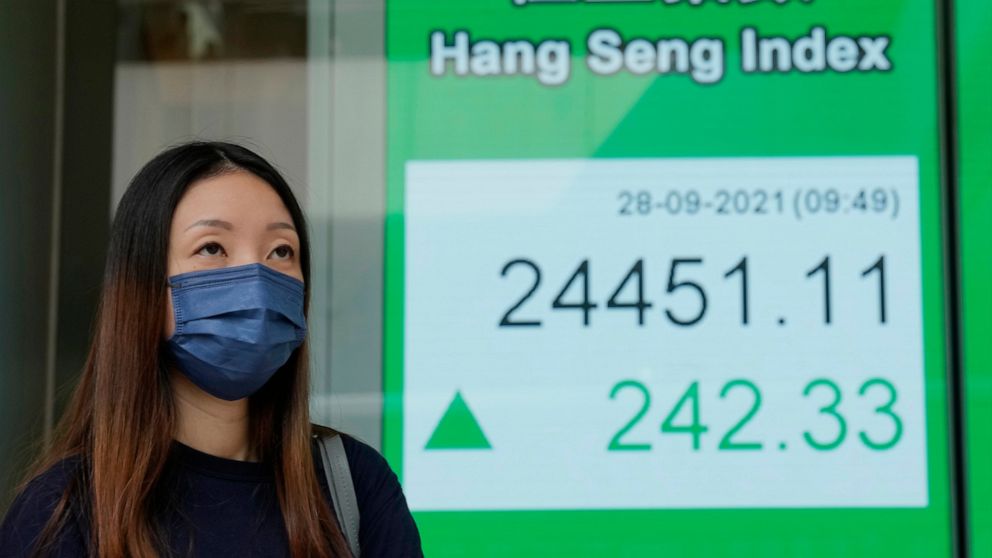Weakness in Big Tech leads stocks lower in early US trading
Stocks are opening lower on Wall Street Tuesday, led by more declines in Big Tech companies
TOKYO — Stocks are opening lower on Wall Street Tuesday, led by more declines in Big Tech companies. The S&P 500 fell 0.8% and the tech-heavy Nasdaq gave up 1.4%. Microsoft, Google’s parent company and Facebook were all down about 2%. The weakness in tech came as bond yields continued to march higher, which tends to draw money out of stock sectors like tech that soared to lofty valuations. The yield on the 10-year Treasury note climbed to 1.54%, the highest since late June. Energy stocks bucked the downward trend and rose as crude oil prices continued to move higher.
THIS IS A BREAKING NEWS UPDATE. AP’s earlier story follows below.
TOKYO (AP) — Global shares mostly fell Tuesday as concerns about China chipped away at investor optimism following a mixed finish on Wall Street.
France’s CAC 40 declined 1.4% in early trading to 6,561.06. Germany’s DAX slipped 0.8% to 15,443.31. Britain’s FTSE 100 shed 0.4% to 7,035.80. U.S. shares were set for a retreat, with the future for the Dow Industrials down 0.4% to 34,617.00. The S&P 500 future lost 0.7% to 4,404.25.
In Asia, Japan’s benchmark Nikkei 225 lost 0.2% to finish at 30,183.96. Australia’s S&P/ASX 200 slipped 1.5% to 7,275.60. South Korea’s Kospi declined 1.1% to 3,097.92. Hong Kong’s Hang Seng added 1.2% to 24,500.39. The Shanghai Composite index climbed 0.5% to 3,602.22.
A power crunch in some parts of China has shut down factories and left some households without electricity under an effort to meet official energy use targets. That could have global repercussions, including on supplies needed for manufacturing throughout Asia, coming right ahead of the year-end shopping season.
That’s on top of parts and raw material shortages that already ail regional manufacturing because of supply disruptions caused by the coronavirus pandemic.
Analysts say the power shortage in China could become prolonged as the demand for coal and natural gas surges during the winter.
Another lingering market worry resonating from China is the possible collapse of one of China’s biggest real estate developers, Evergrande Group, which is struggling to avoid a default on billions of dollars of debt.
“Crucially, contagion risks loom large due to transmission within the property sector due to similar risks to home-buyers and banks via balance sheet exposures,” said Vishnu Varathan of the Asia & Oceania Treasury Department at Mizuho Bank. “Fact is Evergrande is at best a risk that has temporarily abated but is far from abolished.”
The vote for the leader of Japan’s ruling party, set for Wednesday, was also weighing on Tokyo trading, according to analysts, as players took a wait-and-see attitude. Four candidates are in the race to replace Prime Minister Yoshihide Suga, who is stepping down after a year in office. No major economic or foreign policy changes are expected, as the pro-U.S. Liberal Democratic Party has ruled Japan almost continually in recent decades.
Consumer spending has been the key driver for the economic recovery and it has been crimped in part by rising cases of COVID-19 because of the highly contagious delta variant, which remains a huge concern in Asia.
In energy trading, benchmark U.S. crude added 73 cents to $76.18 a barrel in electronic trading on the New York Mercantile Exchange. It gained $1.47 to $75.45 per barrel on Monday.
Brent crude, the international standard, rose 68 cents to $80.21 a barrel.
In currency trading, the U.S. dollar rose to 111.26 Japanese yen from 110.00 yen. The euro cost $1.1679, inching down from $1.1684.
———
Yuri Kageyama is on Twitter https://twitter.com/yurikageyama
![]()


